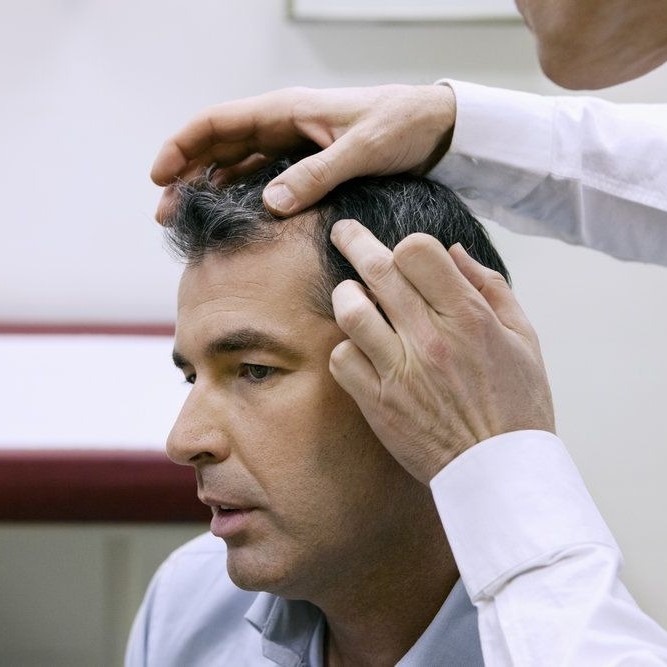
Does Eliquis Cause Hair Loss? Exploring Common Side Effects
Introduction to Eliquis and Its Uses
Eliquis (apixaban) is a prescription medication widely used to prevent blood clots in certain medical conditions. It is particularly effective for patients with atrial fibrillation, deep vein thrombosis, or those who have undergone major surgeries such as hip or knee replacements. Patients concerned about their treatment often ask, “Does Eliquis cause hair loss?” Hair loss can significantly impact a person’s self-esteem, making it crucial to explore potential side effects related to this medication. In this article, we will analyze the relationship between Eliquis and hair loss, delving into the evidence, side effects, and possible management strategies for patients.

Understanding the Mechanism of Eliquis
To comprehend the potential side effects of Eliquis, it’s essential to understand how the medication works in the body. Eliquis belongs to a class of drugs called direct oral anticoagulants (DOACs). Its primary function is to inhibit specific clotting factors, particularly Factor Xa, which plays a critical role in the coagulation cascade. By decreasing the ability of blood to clot, Eliquis effectively reduces the risks associated with strokes and thromboembolic events.
While this anticoagulant effect is crucial for preventing dangerous clots, it can also lead to collateral effects on other bodily systems, including those governing hair growth. Disruption of the blood’s natural processes can lead to hormonal fluctuations and nutritional deficiencies, both of which are known contributors to hair loss.
Does Eliquis Cause Hair Loss?
Now, let’s address the core concern: does Eliquis cause hair loss? Based on current research and patient reports, there is no direct evidence conclusively linking Eliquis to hair loss. However, anecdotal reports from patients suggest that some individuals experience increased shedding or thinning of hair during their treatment.
The phenomenon of hair loss is complex. It may occur due to several factors, including medication side effects, physical stress, emotional turmoil, or changes in hormone levels. Many patients taking blood thinners report experiencing temporary hair loss, commonly referred to as telogen effluvium. This condition occurs when your body undergoes significant stress, leading to hair follicles prematurely entering the resting phase of the growth cycle.
It’s essential to consider other potential contributors when facing hair loss. Factors such as diet, lifestyle changes, and other concurrent medications may all impact hair health during your course of treatment with Eliquis.
Common Side Effects of Eliquis
In addition to hair loss, Eliquis has several common side effects that patients should be aware of. Recognizing these side effects can help individuals prepare for their treatment and engage in proactive discussions with healthcare providers. Common side effects include:
Bleeding:
-
- Increased Risk: Eliquis is primarily known for its potential to significantly raise the risk of bleeding in patients.
- Minor Bleeding: This can manifest as minor issues, such as easy bruising, where patients may find that they bruise more easily than before starting the medication.
- Serious Complications: In more severe cases, patients might experience gastrointestinal bleeding, which can present as blood in stool or vomiting blood. This serious side effect necessitates immediate medical attention.
Nausea:
-
- Common Sensation: Upon initiation of Eliquis, many users report experiencing nausea or general stomach discomfort.
- Adaptation Over Time: While this side effect can be unpleasant, it is often manageable as many patients find that their bodies adjust to the medication over time, leading to a reduction in nausea symptoms as treatment continues.
Fatigue:
-
- Frequent Complaint: Fatigue is frequently cited by patients who are on Eliquis, with many expressing feelings of tiredness that differ from their usual energy levels.
- Physiological Factors: This tiredness may be linked to changes in blood circulation and oxygen delivery to tissues, which can be impacted by the medication and can lead to an overall sense of lethargy.
Anemia:
-
- Consequences of Bleeding: Extended or significant bleeding can result in a reduction of red blood cells, thereby leading to anemia.
- Symptoms of Anemia: Anemia can further exacerbate feelings of fatigue and weakness in patients, creating a cycle that may require management through dietary changes or additional supplements.
Hair Loss:
-
- Anecdotal Evidence: While not officially recognized as a major side effect of Eliquis, some patients have reported experiencing increased hair thinning or shedding during their treatment.
- Need for Investigation: This phenomenon, although not widely documented, may need further investigation to determine a potential link between Eliquis and hair loss, and could prompt patients to seek advice from healthcare professionals regarding this concern.
Being aware of the side effects can facilitate better management and open communication lines with healthcare providers. If you notice side effects, especially concerning changes in hair health, it’s vital to schedule an appointment for evaluation.
How to Stop Hair Falling Out from Blood Thinners
If you are experiencing hair loss while on Eliquis or any blood thinner, there are several strategies you can consider to help manage this concerning issue:
Consult Your Doctor:
- Start by scheduling an appointment with your healthcare provider to discuss your concerns about hair loss.
- Be prepared for an open and honest conversation regarding your medical history, overall health, and any medications you are currently taking.
- Your doctor will evaluate whether Eliquis, or any other medications, may be contributing to your hair loss by reviewing potential side effects and interactions.
- This assessment is crucial for developing an appropriate plan of action tailored to your individual needs.
Focus on Nutrition:
- Recognize the importance of a well-balanced diet in maintaining healthy hair and preventing hair loss.
- Aim to incorporate a variety of nutrient-rich foods into your daily meals, specifically those that are high in iron, biotin, zinc, and proteins, which are essential for hair strength and growth.
- Consider adding foods like leafy greens (such as spinach and kale), eggs (a great source of biotin), nuts (like almonds and walnuts), and lean meats (like chicken and turkey) to your diet.
- It’s important to be aware that nutritional deficiencies, particularly in these key vitamins and minerals, can significantly impact hair health and contribute to hair loss.
Stress Management:
- Recognize that managing stress effectively is vital, as high levels of stress can trigger hair loss.
- Engage in regular activities that help reduce stress, such as practicing yoga, meditation, or mindfulness exercises.
- Consistent physical exercise, whether through walking, running, or attending fitness classes, can also help alleviate stress while promoting overall well-being.
- Establishing a routine that incorporates these stress-relief practices can enhance both mental and physical health, contributing positively to hair health.
Gentle Hair Care:
- Adopt gentle hair care techniques to help prevent further hair loss and damage.
- Choose mild, sulfate-free shampoos and conditioners that nourish rather than strip your hair of its natural oils.
- Avoid exposing your hair to excessive heat from styling tools like hair dryers, straighteners, and curling irons, as high temperatures can lead to breakage.
- Limit the use of harsh chemical treatments (such as bleaching or perming), which can weaken hair, and consider opting for natural or less damaging alternatives.
Consider Supplements:
- Explore the possibility of taking supplements, such as biotin or other hair growth vitamins, to support hair health and combat hair loss.
- Before starting any new supplements, consult with your doctor to discuss your specific situation and ensure that these supplements are safe and compatible with any existing medications you are taking.
- Your healthcare provider can offer advice on appropriate dosages and potential benefits tailored to your individual needs.
Monitor Health Closely:
- Keep a close eye on any side effects or changes in your health related to the use of Eliquis and other medications.
- Document any instances of hair loss or other concerning symptoms and maintain open communication with your healthcare professional.
- Regular follow-ups with your doctor allow for timely interventions, whether that means adjusting dosages, switching medications, or exploring alternative treatments.
- Being proactive about monitoring your health ensures that any issues can be addressed promptly and effectively.
What is the Most Common Side Effect of Eliquis?
The most common side effect of Eliquis is bleeding. Due to its anticoagulant properties, patients are at an increased risk for bleeding situations. Signs of excessive bleeding can include unexplained bruises, excessive bleeding from cuts, blood in urine, or dark stools. If patients experience severe bleeding episodes, they should seek immediate medical attention.
How Can I Stop My Hair from Falling Out Due to Medication?
Managing hair loss due to medication requires a multi-faceted approach. The first step is always to consult with a healthcare provider to discuss changes in hair health while on medications like Eliquis. If it is determined that the medication may contribute to hair loss, discuss potential alternatives or treatment options.
In addition to professional guidance, consider potential lifestyle changes that can help support hair health. Ensuring proper nutrition, maintaining a balanced diet, managing stress levels, and adopting gentle hair care routines may all contribute to reducing hair loss.
Conclusion
In conclusion, the relationship between the question “Does Eliquis cause hair loss?” and the medication’s effects is complex. While there is no definitive evidence directly linking Eliquis to hair loss, numerous factors can contribute to this condition during treatment. Bleeding represents the most common side effect of this medication, warranting careful monitoring.
Patients experiencing hair loss should maintain open communication with their healthcare providers to evaluate and address their concerns effectively. Through proactive approaches such as dietary changes, stress management, and appropriate hair care, individuals can work to mitigate hair loss while ensuring the safe use of Eliquis.
Eliquis has proven to be an effective medication for many, and understanding its side effects is crucial for successful management. With the right support and information, patients can maintain their health while addressing hair concerns related to their treatment journey. Remember, your health is your priority, and equipped with the right knowledge, you can make informed decisions about your medications and overall wellness.




